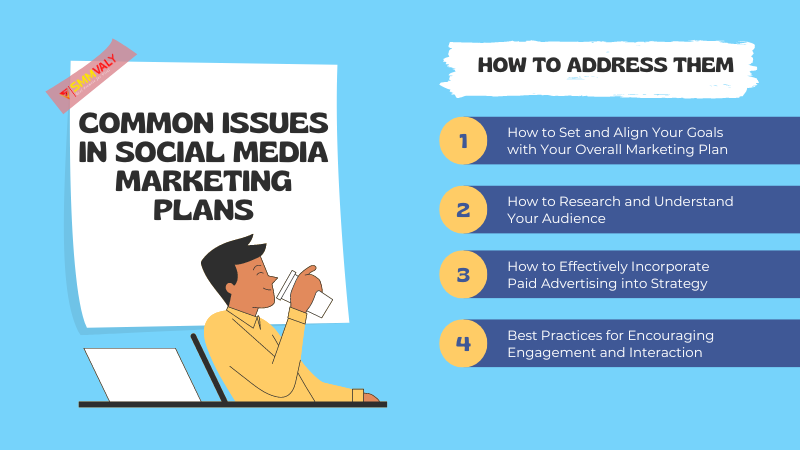
Common Issues in Social Media Marketing Plans and How to Address Them
Social media has become an essential part of any business’s marketing strategy. However, without a clear plan and understanding of its purpose, social media marketing can quickly become ineffective. In this article, we will explore the most common issues faced by businesses in social media marketing plans and provide actionable solutions to address them.
Common Issues in Social Media Marketing Plans and Ways of Addressing Them
Lack of Clear Goals and Objectives
One of the most common issues faced by businesses in social media marketing is a lack of clear goals and objectives. Without a clear understanding of your business’s goals and objectives, it can be challenging to create a social media strategy that aligns with your overall marketing plan.
Importance of Having a Clear Understanding of Goals and Objectives
Having a clear understanding of your goals and objectives is essential for creating an effective social media marketing plan. It helps to ensure that your efforts are focused, and you can measure the success of your campaigns.
How to Set and Align Your Goals with Your Overall Marketing Plan
To set clear goals and objectives, start by defining what you want to achieve with your social media marketing efforts. Your goals should be specific, measurable, achievable, relevant, and time-bound. Once you’ve defined your goals, align them with your overall marketing plan to ensure consistency and integration.
Insufficient Understanding of Your Target Audience
Another common issue in social media marketing is an insufficient understanding of your target audience. Without a clear understanding of your audience’s needs and preferences, it can be challenging to create content that resonates with them.
Importance of Understanding Your Target Audience
Understanding your target audience is crucial for creating relevant and engaging content that resonates with them. It helps to build a loyal following and drive engagement and conversions.
How to Research and Understand Your Audience
To understand your target audience, start by gathering demographic and psycho-graphic data. You can use social media analytics tools to collect data on your audience’s age, gender, location, interests, and behavior. Use this data to create buyer personas that represent your ideal customers.
Over reliance on Paid Advertising
While paid advertising can be an effective way to reach a broader audience, over reliance on paid advertising can lead to diminishing returns. It can also be costly and unsustainable in the long run.
The Dangers of Over reliance on Paid Advertising
Over reliance on paid advertising can lead to a lack of organic growth, which can negatively impact your brand’s reputation. It can also lead to high costs, limited reach, and lower ROI.
How to Effectively Incorporate Paid Advertising into Your Overall Strategy
To effectively incorporate paid advertising into your social media strategy, focus on building organic reach first. Use paid advertising to amplify your reach and promote your best-performing content. Set clear goals and KPIs and measure the effectiveness of your campaigns regularly.
Neglecting Engagement and Interaction with Followers
Many businesses make the mistake of neglecting engagement and interaction with their followers. This can lead to a lack of engagement, low brand loyalty, and a negative impact on your brand’s reputation.
The Importance of Engagement and Interaction with Followers
Engagement and interaction with your followers are critical for building a loyal following and increasing brand awareness. It helps to create a sense of community and fosters a positive brand image.
Best Practices for Encouraging Engagement and Interaction
To encourage engagement and interaction with your followers, create content that is relevant, valuable, and shareable. Respond promptly to comments and messages and show your followers that you value their feedback. Host giveaways and contests, ask questions, and run polls to encourage interaction and engagement.
Inadequate Resource Allocation
Inadequate resource allocation is another common issue faced by businesses in social media marketing. Without sufficient resources, it can be challenging to create quality content, manage multiple platforms, and measure the effectiveness of your campaigns.
Importance of Allocating Sufficient Resources for Social Media Marketing
Allocating sufficient resources for social media marketing is essential for creating a successful strategy. It helps to ensure that you can create quality content, manage your platforms effectively, and measure the effectiveness of your campaigns.
How to Effectively Allocate Your Resources for Optimal Results
To effectively allocate your resources, start by prioritizing your goals and objectives. Focus on creating quality content and engaging with your followers on the platforms that matter most to your business. Use social media management tools to streamline your workflow and track your results.
Conclusion:
In summary, the common issues faced by businesses in social media marketing plans include a lack of clear goals and objectives, insufficient understanding of your target audience, over reliance on paid advertising, neglecting engagement and interaction with followers, and inadequate resource allocation.
Final Thoughts on the Importance of Addressing These Issues
Addressing these issues is crucial for creating a successful social media marketing plan. It helps to ensure that your efforts are focused, and you can measure the success of your campaigns.
Recommendations for Avoiding These Issues and Achieving Success with Social Media Marketing
To avoid these issues and achieve success with social media marketing, start by defining your goals and objectives, understanding your target audience, and building organic reach. Use paid advertising to amplify your reach, but don’t rely on it too heavily. Engage and interact with your followers, allocate sufficient resources, and measure your results regularly. By following these recommendations, you can create a social media marketing plan that delivers results and helps you achieve your business goals.